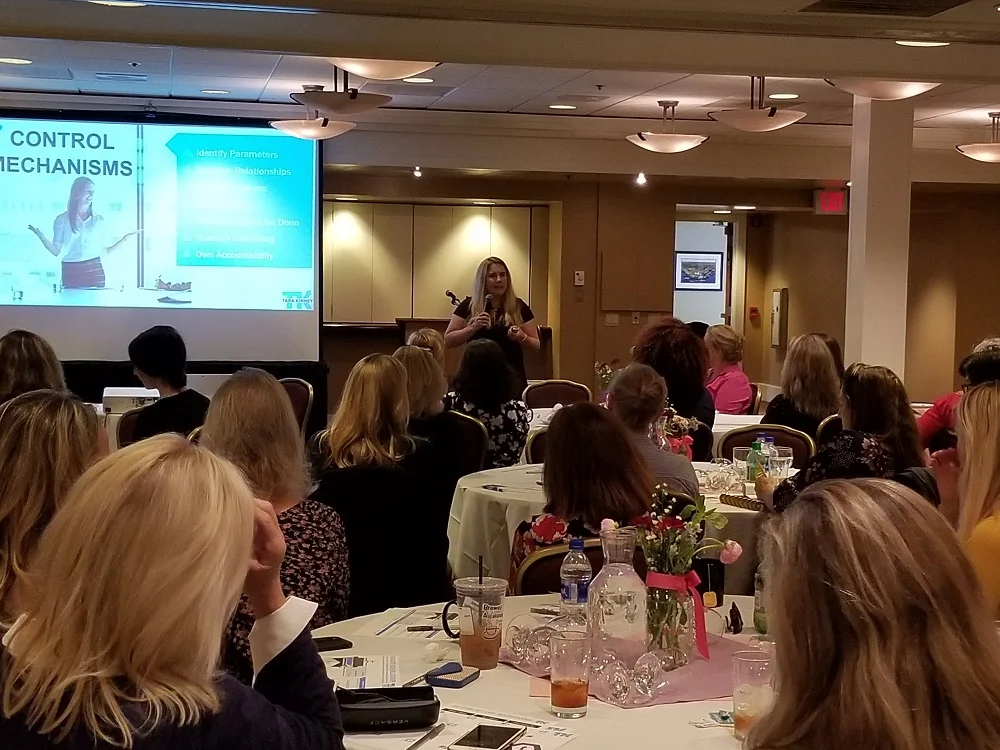Professional Hostage No More: Take Control of Your Professional Reality - Part 2
Tara Kinney was the featured speaker at the Women in Leadership Nexus June 12 Chapter event. In Part 1 of her blog (click here), Tara explores three factors that can influence a woman’s career acceleration. Part 2 of the blog series touches upon seven mechanisms you can leverage to regain control of your professional reality—mechanisms Tara reviewed at the June event.
All too often our professional reality is held hostage by others. We recognize our lack of control whether it be specific to job function, work products, strategic direction, work process, and/or professional advancement. My question is why?
Tara Kinney speaking at the June Nexus event
Why don't we control our own professional destiny? Is it possible to control your job when employed at a major corporation with several management layers above us, or when employed by a small business with no positions to advance toward? What about those of us who are self-employed, solopreneurs, or contractors—how much control do we really have over our professional reality versus the level of control we grant our customers? You have more control than you realize. In fact, if it’s not in your control, then who has it?
It's time to recognize that you add value. That you can control your work product and continue to expand your expertise. This movement doesn't start at the top, it starts with every one of us women taking back control of our professional capacity to improve outcomes, push progress, and advance careers. You may not believe that it is possible, but just wait. I've been trapped before, so I understand your disbelief, but it can be done. Without being aggressive or passive-aggressive, without alienating your boss or colleagues, without ticking off your client, you can negotiate the right to control your work and own your professional reality.
How to Take Control & Thrive
Leverage Relationships: Some relationships are better than others. Leverage the good ones to incrementally regain control of your position with advocates who support you in negotiating past the weaker relationships. Ask for help, put your ideas out there, partner with the people who are good for you.
Embrace Options: Sometimes we are so focused on a specific professional plan that any alternative would be considered a failure. Focus on your desired outcome and consider all the potential pathways to reach your goal. When one doesn't work, you now have a fallback plan NOT a fail. Don’t change your goal; see that there are several ways to get there.
Control Emotions: This does not mean ignoring that you have emotions, we all do. It means not letting them cloud your judgment and drag you off-track from your professional goals. Know how to use your emotions as power and motivation to advance, and when to control those emotions that creep up as roadblocks and obstacles slowing you down, eroding trust, and/or discrediting you. If you feel upset or angry, take a step back, cool off, and re-address the situation when you’ve had time away from it. But don’t give up on your stance if it’s important to you.
Reframe Jobs-to-be-Done: Supervisors, managers, and customers like to tell us exactly what they think we should do to accomplish our goals. As long as we do what they want, they are in control. When you reframe the conversation to focus on what job needs to get done—not each task but the desired outcome—you start to regain control of the job at hand and reach the end goal in a way that works best for you and the company.
Identify Parameters: We often identify boundaries for ourselves, but rarely feel confident that those boundaries free us to operate using our best judgment. Your customers, supervisors, and colleagues need to know and agree to your parameters so that you can control your own work. Clear and direct communication when boundaries have been crossed, and they will be crossed, is key to maintaining control.
Own Accountability: Supervisors and managers use “accountability” as a term by which they manage you. If you own your accountability, measure performance against that shared objective, and set limits on what you can and cannot be held responsible for; you will not only regain control of your professional work, you will become the easiest and highest performing professional with which they have ever had the pleasure of working. You make their life much easier by owning accountability and controlling specific outcomes that provide reliable results.
Nexus members learning how to regain control of their professional reality
Quantify Everything: People may argue opinions or preferences, but they cannot argue with valid data. Numbers support your position, measure your performance, and back-up your negotiation, giving you credibility and control. Determine and find consensus on how success will be measured at the onset of every project, then control your work and measure your performance. Smart, innovative, and armed with data is a superhero suit for every important conversation and a golden key to controlling your professional reality.
The Power is There, Time to Use It
As women, we are fiercely dedicated to the outcomes and the quality of our work efforts and our personal lives. We perform so well under pressure and in multitasking situations and give so much to everything that’s important to us, that we have little leftover for investing in the politics of career advancement.
It’s time to stand up in power and support and mentor each other. Try to go to after-hour events when you can but still stay true to what’s important to you. Search out other women to be your inspiration and hire them to be speakers. Elevate them as leaders, bring them into the boardroom, and include them in important conversations.
Those young women who show a ton of potential and capability? The same ones who have their heads down working so hard that everybody wants them to do their work because they do it the best—pull them into your strategy and management conversations. Don't let them bury themselves in their achievements and their work—help them come out into the political arena and teach them to “politic and position” for senior management roles.
Do what’s right for you in your career and personal life and support your women colleagues without apology. It’s hard at first. We’re people-pleasing creatures by nature. But the more you do it, the more positive outcomes will follow, and you’ll wonder why you didn’t do it sooner.


